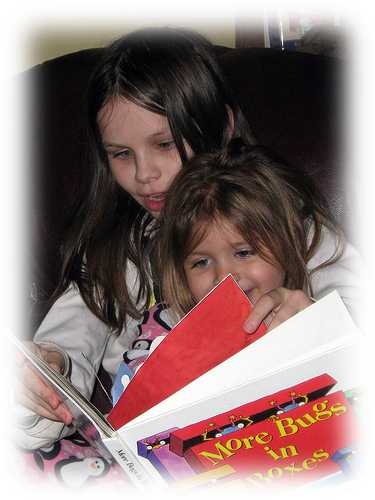Is TELLING children’s stories more beneficial than READING them?
I hope that the fact that reading to children is essential for their literacy and language development is no surprise to you. One thing that I’m quite keen on is telling stories to my daughter and it occured that there is some discussion around the pros and cons of both.
There should also be no confusion that reading stories to your children and/or classroom is an integral part of their educational platform and that storytime in schools is a standard in most education establishments from an early age.
Research shows that even babies benefit through hearing, seeing and touching books during the crucial stages of their development. The first four years of a child’s life is when they learn at the most breathtaking speeds and absorb the most new information with ease.
It is through books that children become aware that words even exist and how they can relate to pictures or events. For children to excel at literacy and the written word, reading books is a must.

Read to and with our children
Reading to children, especially at home does create a special bond between reader and child. However it can also improve a child’s grammar and vocabulary.
Reading children stories from a book also supports an appreciation for literature and the arts.
Most picture books have very creative and unique images that a child will see no where else. You’ll find that there are a number of annual awards given to books for great illustration. For example, in my article on using rhythm and rhyme in storytelling, I mention the Kate Greenaway awards for illustration. Similarly, a quick search on Amazon for the Caldecott Award Winners will give you a whole list of excellent books to read with your kids.
Story reading can also enhance a child’s reading and writing skills as well as their language complexity.

Language is indeed all sound related. From the earliest days, babies are listening to their parents and siblings speak. They are also producing their own sounds to communicate with the people around them.
Reading aloud will help develop language, but speaking to and conversing with a child will have more of an impact.
Books can be read in a way to a child that engage conversation and help teach words and develop sentence structure, but this can also be done through storytelling. Both story reading and storytelling can provoke emotional responses which are an essential component to learning language.
Group story times help children feel comfortable with their peers and help development important social awareness while meeting potential friends.
Storytelling with our kids
Although storytelling can be an extension of an original written story, it expands into areas that not only promote language skills but also creative and imaginative skills.
Children who are engaged in storytelling with their educators see first hand how creativity is put to use through puppets, music and the arts.
It also encourages an active imagination as children envision the setting or characters of a told story as adults would do when reading a novel.
Storytelling also promotes memory capacity and helps with story comprehension skills.
Listening to a storyteller can also influence and may even increase a child’s confidence to use language effectively to communicate with other people.
Story reading AND story telling
I think that it is fairly clear that both storytelling and story reading are essential to the overall development of language in children and each should be encouraged and worked on.
Each style complements the other and can be used in corresponding ways.
Both engage the listener to enjoy the company of others while learning with seamless effort.
Some great advice on encourage story telling I had was to get involved in and encourage role play and puppeting. Our kids naturally create characters from pretty much anything and then will role play out scenarios and situations and different character types and attitudes.
If we get involved in these, we can help shape those sessions and both encourage and start providing those social and educational benefits of stroytelling.
On a final note, as our children’s ability to tell a story increases, they will inevitably experiment and take it too far and become fantastical when you’re actually trying to have a serious conversation with them. Check out my article on working with your child when he or she starts making too much of storytelling and edges into lying.
Since we are going through big changes between printing and video, I would like to point this children animated stories effort for storytelling. BookBox is creating animated stories with Same Language Subtitling, synchronizing the text, audio, and visual to create an educational and entertaining reading experience.
BookBox is indeed a great idea Pam! I’ve now written about it too: Improving Literacy through reading and closed captions